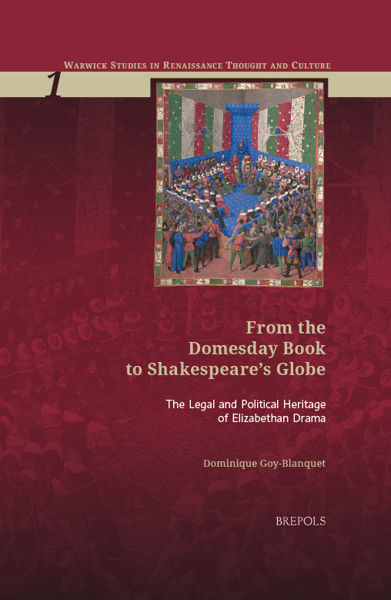
Dominique Goy-Blanquet, From the Domesday Book to Shakespeare’s Globe. The Legal and Political Heritage of Elizabethan Drama
The phrase ‘Jus Uncommon’ summarizes England’s claim to independence from Europe, a claim supported by its unique legal system and Elizabethan theatre, and their strong interconnexion. Elizabethan tragedy begins at the Inns of Court. It was no mere coincidence, but a result of the long history of intersecting processes of law, politics, and theatre. This book sets out to contextualize and explore such legal and literary intersections, charting the emergence of Elizabethan legal culture from its various English and European sources over the course of the four hundred years running from Magna Carta to Shakespeare. It encompasses the major strands of legal history and culture that formed the background to Elizabethan political drama, republican tradition, theories of monarchical sovereignty, European and English theories of imperium, pedagogical and rhetorical practices of the Inns of Court, legal-antiquarian research, parliamentary privilege, and Tudor political pamphleteering.
Legal texts, discourses, and social practices constructed a pervasive intellectual culture from which Elizabethan drama – like Shakespeare’s – emerged. Shakespeare is not the central object of this study, but he is central to its argument. What he knew about law was what collective memory had stored from centuries past at home and abroad. The issues, characters, themes, theories, and metaphors dramatized by the Elizabethan playwrights followed the way opened at the Inns. Emblematic figures of lawyers-writers and their Senecan patterns paved the way to Gorboduc and to Shakespeare’s histories.
—
Table of contents
Editorial Note
Introduction : Law or Liberty?
Part I. Jus uncommon. Freedom of the State
Chapter 1. Dreams of Empire
Early Steps to Singularity
Clashes of Jurisdictions
Sacred Monarchy
Chapter 2. England’s Mixed Polity
English Democrats
Good Counsel
Model Parliaments
Right of Conquest
Chapter 3. Rival Law Codes
Roman Law
The Common Law of the Realm
Emergence of the Inns
Upward Mobility
Part II. Fair Trial. Freedom of Magistrates
Chapter 4. Learned Counsel
A Display of Legalism
The Courtly Muses of Europe
Chapter 5. Divorcing Rome
King’s Conscience
King’s Printer
King’s Games
Chapter 6. Fortune’s Wheels
Common Prayers
Heretics on Trial
‘Something Tawdry’. The Political Pageant
‘An Axe or an Acte’. The Execution of Justice
Part III. The Conscience of England. Freedom of Speech
Chapter 7. The Languages of Law
The Legal Nursery
Won in Translation
Chapter 8. Theatres of Law
Dramatic Justice
Political Tragedy
Chapter 9. Lawyers in Parliament
‘Shall Cassandra Bee Punished?’ The Liberties of the House
Clean and Unclean Money
The Lawyer’s Glasses of Governance
Chapter 10. Kings do but Play Us
Lawyers in Resistance
A Parliament of Voices
Conclusion. ‘This Magnificent Theatre of Heaven and Earth’
Select Bibliography
Index of Acts, Statutes, and Treatises
Index of Plays, Poems, Dialogues, and Masques
General Index
—
Dominique Goy-Blanquet is professor emeritus at the University of Picardie, France, and a member of the editorial board of En attendant Nadeau. Her works in English include Shakespeare’s Early History Plays: From Chronicle to Stage (OUP, 2003), Shakespeare in the Theatre: Patrice Chéreau (Arden, Bloomsbury, 2018), essays for Shakespeare Survey, Cambridge Companion, Moreana, Law and Humanities, and most recently a chapter on Tudor lawyers in volume 6 of A Cultural History of Law, edited by Gary Watt (Bloomsbury, 2019).
—
On peut lire sur en-attendant-nadeau.fr un article sur cet ouvrage :
"Shakespeare, ou si le droit m’était conté", par Marc Porée (en ligne le 9 juillet 2024).
Le théâtre est politique. La cause est entendue, mais il n’est jamais mauvais de le rappeler. Le dernier ouvrage que signe notre camarade Dominique Goy-Blanquet s’y emploie avec rigueur et conviction. Paru aux prestigieuses éditions Brepols, From the Domesday Book to Shakespeare’s Globe multiplie les éclairages savants mais toujours accessibles. L’ancienne présidente de la Société Shakespeare s’y montre une généticienne accomplie, remontant la piste des avant-textes théâtraux et juridiques, au service d’une leçon qui ne souffre pas la moindre contestation : farci de droit et épris de liberté, le théâtre, shakespearien en tout premier lieu, mais globalement anglais, défend la rule of law comme personne.